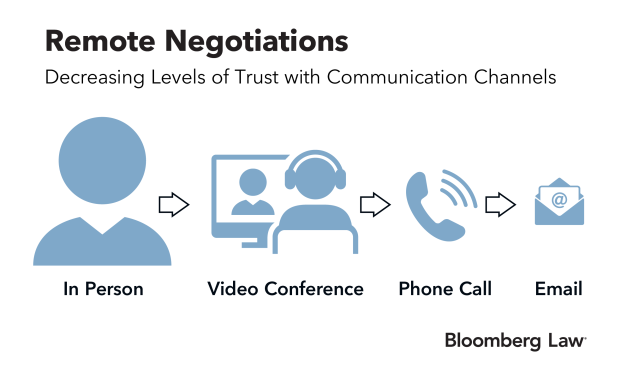Originally published in Bloomberg Law Insights, June 16, 2020, 10:00 AM
Negotiation skills are an unshakable foundation of successful lawyering. How effective you are in getting your points across to your clients, co-counsels and the other side determines the success of your representation to a vast extent. Covid-19 has brought about many challenging negotiations and a variety of new skills are needed to deal with them.
But the increased challenge doesn’t stop with the uncertainties of the crisis itself. Negotiators all over the world are now also forced to communicate via online mediums, requiring quick adjusting of their skills to ensure maximum effectiveness in reaching results for their clients in a purely digital environment.
Studies have shown various degrees to which online negotiations are more likely to end in impasse than face-to-face negotiations. Some authors (like the author of this Harvard Business School article) found up to 50% of impasse in email, versus only 19% in face-to-face negotiations.
We have synthesized the three key challenges that make virtual negotiations more difficult, along with some practical tips to deal with them.
Trust and Rapport
More than anything, negotiation success depends on the trust we build with our counterpart. Reliant on small talk, body language and shared meals and laughs, trust thrives in physical presence. It becomes scarcer with reduced levels of presence (see figure below; the decreasing size of boxes equal decreasing trust). This has a significant influence on information sharing and results.
Make sure to consciously maximize your rapport and trust-building when negotiating remotely.
- Choose your medium wisely. Videoconference, phone and email all have different pros and cons. Make sure you set your priorities for every interaction. Is it trust or speed, efficiency or clarity for instance? Pick the richest medium possible (i.e. video conference at the moment) for initial interactions to allow you to build trust.
- Spend conscious time on small-talk. Online communications tend to be more task-oriented and to the point. Make an effort to get to know each other before getting down to business.
- Match your pitch, speed and tone to create rapport. We feel at ease with people we perceive as similar to us.
Ease the Communication Conundrum
With physical presence, shared coffees and contextual cues significantly reduced, our ability to “read” the other side decreases. Verbal communication skills, therefore, emerge as the paramount factor of success. Make sure you make the most of them.
- Summarize frequently. Especially in complex transactions, skilled negotiators summarize the discussion and their understanding frequently to make sure everyone is on the same page. Even more so online.
- Use graphics. Prepare to show complex concepts or numbers in a simple graphic.
- Use a virtual flipchart. Feature it like you would in a conference room.
- Talk with labels. Flag what you are going to do next to make it easy for others to follow. “Let me make a proposal here.” “I’d like to add a point to that proposition.”
- Be explicit. Don’t assume your counterpart will be able to read between the lines (“I am feeling a bit frustrated about our process” rather than “Is this really the best we can do?”). State your assumptions clearly.
- Focus on listening carefully. Since auditory input may be the only channel you have, make sure you are listening extra carefully to what is said (also between the lines).
- Send a summary. of what you have discussed on the call immediately after to make sure everyone is on the same page. Ask the other side to clarify if anything is incorrect or incomplete.
- Make your interests and priorities clear. Use language like, “I am interested in finding a deal where …” and “My priority is …”
- Use empathetic language. “I appreciate where you are coming from.”
- Ask clarifying questions. Be sure to inquire about what is important to them. “What is the priority for you on this?”
- Get to the point. Use clear and concise language, busy people do not have the time to deep read long emails.
Mind the Cross-Cultural Gap
Especially in cross-cultural interactions, social norms can be unclear and building trust and rapport can be hampered by the lack of contextual cues. When all you have is words in an email or a voice on the phone, connecting over a common style is even more difficult and needs careful focus and conscious effort.
- Read up on the culture if you are not familiar. There is no “typical” European, Asian or American. The differences are huge, fail to understand them at your peril.
- Understand how hierarchy and decision making works in the culture you are dealing with (this is a great book to get you started).
- Listen for cues of their style in their language (“I would like everyone to contribute”; “I would like to get a feeling for …”; “Let’s cut to the chase”).
- Invite them for a get-to-know meeting before the actual negotiation.
- Understand if you are dealing with people from a high-context or low-context culture and if in doubt, always add a bit more context to make sure nothing gets lost between the lines; i.e., know when to be direct.
- Clarify your understanding to make sure you fully appreciate what they mean.
- Check your own language for national or professional slang (“Our views are parallel” might just translate into “two lines that never meet”).
- Bring more help (open ears) to the negotiation to help pick up on subtle cues. Have someone read between the lines or even someone who knows the culture.
- Check in how they are feeling about the process. “I have a sense that our approach might be a bit too technical for you. Is that right?” or “I wonder if we are getting to the point quickly enough. Would you mind sharing how this has been going for you so far?”
- Watch your clock. Be extra punctual for some cultures, and ready to go significant over time with others. Don’t make Germans wait or cut Brazilians off once the agreed hour is up.
- Watch for arising frustration or impasse. If you say something, make a proposal or ask a question and suddenly the other side gets quiet, defensive or even aggressive, check what is happening and make sure there are
Author Information
Claudia Winkler is a lawyer and negotiation and international client communication trainer based in Vienna, Austria. As a Fulbright Scholar trained at the Harvard Law School Negotiation Project, Claudia founded the Negotiation Academy™ in 2014.



